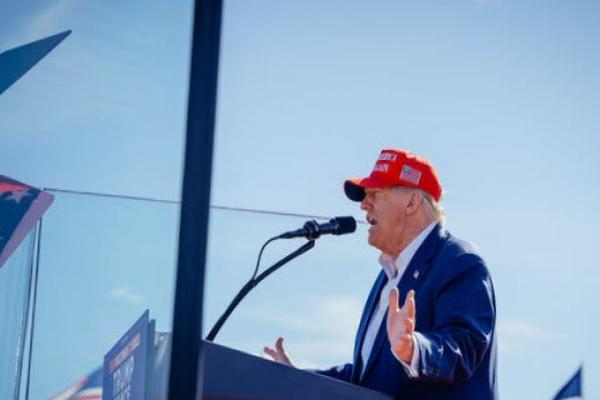U.S
Economists have doubts
For Trump, Tariffs Are the Solution to Almost Any Problem. The former president has proposed using tariffs to fund child care, boost manufacturing, quell immigration and encourage use of the dollar.
Updated 2024-Oct-05 18:34

Trump, wearing a blue jacket, white shirt and red hat, stands at a lectern in front of a microphone. Former President Donald J.
One study discovered that the expenses for a childcare program may not be as high as other costs with estimates suggesting a universal prekindergarten program for 3 and 4 year olds would total $351 billion in the next decade.
On the other hand the Congressional Budget Office estimated that the tax reductions implemented by Mr.Trump in 2017 would accumulate a cost exceeding $4 trillion within a decade. Another study by economists from the Peterson Institute determined that imposing a 10 percent tariff on all imports and a 60 percent tariff specifically on products from China would bring in around $227 billion annually.
However the economists suggested that the estimate might be too high due to the impact of tariffs and retaliation from other nations which could result in decreased economic growth and an increase in the dollar s value.
Additionally consumers may choose to purchase products without tariffs instead of those with them leading to a decrease in tariff revenue in the long run.
Furthermore there may be a requirement for certain tariff income to provide compensation to exporters whose companies were impacted by a trade war.
It has been more than five years since former President Donald J. Trump called himself a Tariff Man but since then his enthusiasm for tariffs seems only to have grown.
Mr. Trump has long maintained that imposing tariffs on foreign products can protect American factories narrow the gap between what the United States exports and what it imports and bring uncooperative foreign governments to heel.
While in office Mr. Trump used the threat of tariffs to try to convince Mexico to stop the flow of undocumented immigrants across the U.S. Border and to sway China to enter into a trade deal with the United States. But in recent weeks Mr.Trump has made even more expansive claims about the power of tariffs including that they will help pay for child care combat inflation finance a U.S. Sovereign wealth fund and help preserve the dollar’s pre eminent role in the global economy. Economists have been skeptical of many of these assertions.
While tariffs generate some level of revenue in many cases they could create only a small amount of the funding needed to pursue some of the goals that Mr.Trump has outlined. In other cases they say tariffs could actually backfire on the U. S. Economy by inviting retaliation from foreign governments and raising costs for consumers.
Economic research has indicated that the cost of tariffs tend to be borne by American businesses and households rather than foreign companies.
Trump seems drawn to trade tariffs as a bargaining tool with other countries because tariffs have powerful domestic political symbolism are much easier to turn on and off than financial sanctions and can be tweaked with shifting circumstances said Eswar Prasad a trade economist at Cornell University.
The irony is that using tariffs to punish countries that use unfair trade practices or are trying to reduce their dependence on the dollar is likely to end up hurting the U.S. Economy and consumers he said. At a rally in Wisconsin on Saturday Mr. Trump also suggested that tariffs could be wielded as punishment against nations that turn away from using the U.S. Dollar in international trade. Countries like Russia and China have tried to finance a limited amount of their trade in their own currencies as a way to sidestep Western sanctions and combat the dominance that the U.S. Government has over the global economy. Mr. Trump suggested that countries that tried to switch away from the dollar would be faced with big levies on their products.
You leave the dollar and you’re not doing business with the United States because we are going to put a 100 percent tariff on your goods he said.
Karoline Leavitt the national press secretary for the Trump campaign stated that in his initial term Mr.Trump effectively enforced tariffs on China and reduced taxes for diligent Americans and he plans to do the same in his next term.
President Trump s proposal will lead to millions of job opportunities and hundreds of billions of dollars coming back from China to the United States.
Economists have pointed out additional disadvantages of tariffs. In a report released on Monday the World Trade Organization stated that tariffs have a greater impact on low income families who allocate a higher percentage of their income towards purchased items as well as on women and smaller businesses which may struggle to afford the increased expenses.
Trump has argued that his tariffs would decrease inflation as stated.
